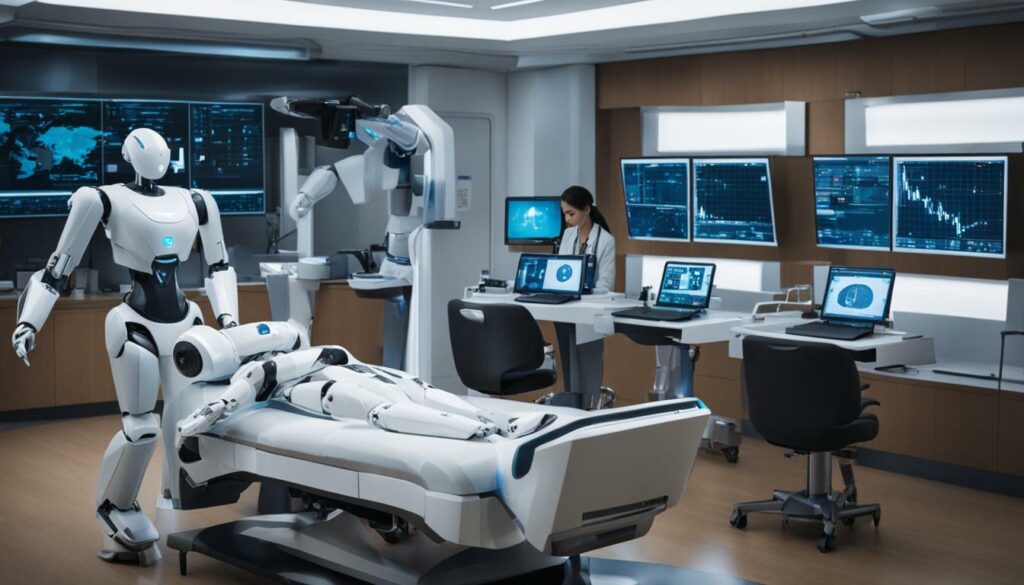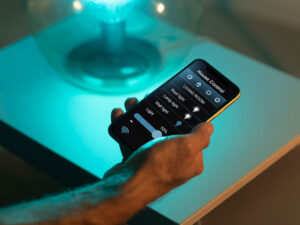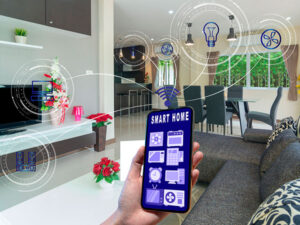
Health tech is revolutionizing the way we approach wellness, with innovative solutions and industry advancements transforming the global health landscape. Digital health, medical technology, and information technology in healthcare are driving the rapid growth of the health tech industry. Top tech companies and health tech startups are at the forefront of this revolution, developing cutting-edge health apps and healthcare innovations. From telehealth and surgical technology to X-ray technology and health tech solutions, technology is reshaping the healthcare industry.
Key Takeaways:
- Health tech is revolutionizing wellness and transforming the global health industry.
- Top tech companies and health tech startups are driving innovation in digital health and medical technology.
- Information technology in healthcare is playing a crucial role in advancing healthcare solutions.
- Telehealth, surgical technology, and X-ray technology are among the key areas of healthcare being transformed by health tech.
- The health tech industry offers new opportunities for medical laboratory technicians and other healthcare professionals.
The Growing Importance of Health Tech in the Digital Era
In today’s digital era, health tech has emerged as a crucial component of healthcare, playing a vital role in enhancing wellness and improving patient outcomes. With the rapid advancements in technology, the healthcare industry is embracing digital solutions to address various challenges and provide better access to care.
One of the key benefits of health tech is its ability to empower individuals to take control of their own well-being. Through health apps and wearable technology, people can effortlessly track their physical activity, monitor vital signs, and gain valuable insights into their overall health. This data-driven approach fosters a proactive mindset towards wellness, encouraging individuals to make positive lifestyle changes and seek timely medical intervention when needed.
Furthermore, health tech is revolutionizing the way healthcare is delivered, particularly through telehealth and remote healthcare solutions. Telemedicine enables patients to consult with healthcare professionals remotely, eliminating the barriers of distance and enabling access to specialized care. It not only improves convenience for patients but also increases efficiency and reduces healthcare costs.
Advancements in Health Tech and Their Impact on Global Health Trends
- Wearable technology: From smartwatches to fitness trackers, wearable devices have gained immense popularity in recent years. These devices monitor various health parameters, such as heart rate, sleep patterns, and stress levels, providing users with real-time feedback and actionable insights.
- Telemedicine: Telemedicine has transformed the way healthcare services are delivered, providing remote access to medical professionals and enabling virtual consultations. This has proven to be especially beneficial for patients in rural and underserved areas, as well as those with limited mobility.
- Health tech startups: The rise of health tech startups has brought innovation and disruption to the healthcare industry. These startups are developing cutting-edge solutions ranging from medical devices and diagnostics to digital therapeutics and personalized medicine.
- Health apps: With the increasing popularity of smartphones, health apps have become an integral part of our daily lives. These apps offer a wide range of functionalities, including symptom tracking, medication reminders, and mental health support, making healthcare more accessible and convenient.
As technology continues to evolve, the potential of health tech in improving wellness and transforming healthcare is vast. However, it is important to strike a balance between utilizing digital health tools and maintaining a human-centered approach to care. By harnessing the power of technology while preserving the essential elements of compassionate healthcare, we can truly revolutionize wellness in the digital era.

The continuous advancements in health tech have revolutionized global health trends, offering new possibilities for prevention, diagnosis, and treatment. From wearable technology to health trackers, telemedicine to innovative medical devices, the integration of digital health solutions has transformed the healthcare landscape.
One significant area of advancement is the development of health trackers and wearable technology. These devices, ranging from fitness bands to smartwatches, enable individuals to monitor their health in real-time, tracking vital signs, physical activity, and sleep patterns. With the ability to collect and analyze data, health trackers empower individuals to take control of their wellness and make informed decisions about their lifestyle choices.
Telemedicine, another breakthrough in health tech, has opened up new avenues for remote healthcare delivery. Through telecommunication technology, patients can access medical consultations, monitor chronic conditions, and receive follow-up care from the comfort of their homes. This innovation not only improves access to healthcare services but also reduces the burden on traditional healthcare systems.
Key Takeaways:
- Advancements in health tech are reshaping global health trends, providing new opportunities for prevention, diagnosis, and treatment.
- Wearable technology and health trackers allow individuals to track and monitor their health in real-time, empowering them to make informed decisions about their well-being.
- Telemedicine enables remote healthcare delivery, improving access to medical consultations and reducing the strain on traditional healthcare systems.

The rise of health tech startups further highlights the immense potential of technology in advancing healthcare. These startups are bringing innovative solutions to the market, addressing various challenges in the health industry. From health apps that provide personalized wellness recommendations to medical devices that enhance diagnostics and treatment, these startups are driving healthcare innovation forward.
As the health tech industry continues to evolve, it is important for individuals and healthcare professionals to embrace these advancements while maintaining a balanced approach. While technology has the potential to revolutionize healthcare, it should be seen as a tool that complements human expertise and care. By leveraging the power of health tech, we can usher in a new era of personalized medicine, improved patient outcomes, and a healthier future for all.
The Role of Automation and Artificial Intelligence in Healthcare
Automation and artificial intelligence have become indispensable tools in healthcare, revolutionizing the way healthcare providers deliver quality care and empowering patients to take control of their own well-being. With the rapid advancements in medical technology, automation has streamlined processes, enhanced efficiency, and improved patient outcomes. Artificial intelligence, on the other hand, has opened new doors for personalized healthcare and treatment options.
One of the primary benefits of automation in healthcare is its ability to handle repetitive tasks with precision and accuracy. Medical professionals can now rely on automated systems for tasks such as appointment scheduling, billing, and medical record management, allowing them to focus more on patient care. Automation also reduces the risk of human error, ensuring that critical information is properly documented and accessible whenever needed.
Artificial intelligence (AI) is transforming the healthcare industry by enabling data-driven decision-making and predictive analytics. Through AI-powered algorithms, healthcare providers can analyze vast amounts of patient data, identify patterns, and make accurate diagnoses. AI systems can also assist in monitoring patients remotely, providing real-time insights and alerts to medical professionals, enabling timely interventions. Furthermore, AI-driven chatbots and virtual assistants are improving patient communication and engagement by offering personalized recommendations and answering medical queries.
The Benefits of Automation and AI in Healthcare:
- Improved efficiency and accuracy in administrative tasks
- Enhanced patient care through personalized treatment options
- Real-time monitoring and predictive analytics for early detection and intervention
- Cost-effective healthcare solutions through reduced manual labor and streamlined processes

As the healthcare industry continues to evolve, the integration of automation and artificial intelligence will play a crucial role in shaping the future of healthcare delivery. These technologies have the potential to revolutionize the way we approach healthcare, making it more accessible, precise, and patient-centric. However, it is essential to strike a balance between utilizing these tools and maintaining the human touch in healthcare. The collaboration between technology and healthcare professionals has the power to unlock innovative solutions and transform the well-being of individuals worldwide.
The Power of Telemedicine and Remote Healthcare Solutions
Telemedicine and remote healthcare solutions have bridged the gap between patients and healthcare providers, ensuring access to care anytime, anywhere. With the advancements in digital health and healthcare technology, individuals can now receive medical consultations, diagnoses, and treatment remotely, eliminating the need for physical appointments and reducing waiting times.
One of the key benefits of telemedicine is its ability to provide healthcare services to individuals in remote or underserved areas. People living in rural communities or areas with limited access to healthcare facilities can now connect with doctors and specialists through video consultations, receiving the necessary medical guidance without the need to travel long distances.
Additionally, telemedicine has proven to be particularly valuable during times of crisis, such as the current COVID-19 pandemic. By offering virtual visits, healthcare providers can minimize the risk of exposure for both patients and medical staff, while still ensuring that essential care is delivered.
The Benefits of Remote Healthcare
- Increased accessibility: Telemedicine allows individuals to access healthcare services regardless of their location, improving access for those in remote or underserved areas.
- Convenience and flexibility: Patients can schedule virtual visits at their convenience, reducing the need for time-consuming in-person appointments.
- Reduced healthcare costs: By eliminating the need for travel and reducing hospital visits, telemedicine can help lower healthcare expenses for patients.
- Efficient use of resources: Remote healthcare solutions optimize the use of healthcare resources, allowing medical professionals to focus on critical cases while providing routine care remotely.
Telemedicine and remote healthcare solutions are revolutionizing the way healthcare is delivered, making quality care more accessible and convenient for patients around the world. As technology continues to evolve, we can expect further advancements in digital health and remote healthcare, improving the overall well-being and health outcomes for individuals everywhere.

Wearable Technology and Health Trackers: The Future of Personalized Wellness
Wearable technology and health trackers are revolutionizing personal wellness, empowering individuals to track and optimize their health habits like never before. These innovative devices, ranging from smartwatches to fitness bands, allow users to monitor their physical activity, sleep patterns, heart rate, and more. By providing real-time data and personalized insights, these gadgets are shaping the way we approach our well-being.
With wearable technology, individuals can set goals, receive reminders, and track their progress towards achieving a healthier lifestyle. Whether it’s counting steps, monitoring heart rate zones during workouts, or analyzing sleep patterns, these devices offer a wealth of information that can be used to make informed decisions about our health.
Benefits of Wearable Technology and Health Trackers:
- Effortless Monitoring: Wearable devices provide continuous monitoring of various health parameters, allowing users to keep a close eye on their well-being without the need for cumbersome manual tracking.
- Accountability and Motivation: With built-in features like activity reminders and progress tracking, wearable technology keeps users motivated and accountable, helping them stay on track towards their wellness goals.
- Personalized Insights: Health trackers analyze data and provide personalized insights, shedding light on areas for improvement and offering tailored recommendations to optimize health routines.
- Integration with Health Apps: Many wearable devices seamlessly integrate with health apps, allowing users to centralize their health data for a comprehensive view of their well-being.
As the field of wearable technology continues to advance, we can expect even more sophisticated devices that offer enhanced accuracy, expanded functionalities, and seamless integration with other healthcare technologies. The future of personalized wellness lies in the hands of wearable devices, empowering individuals to take control of their health and make informed decisions towards a happier, healthier life.
![]()
As health tech continues to evolve, embracing its transformative potential is crucial for creating a healthier future for individuals and communities worldwide. With the rapid advancements in digital health and healthcare technology, the health industry is witnessing a revolution that promises improved wellness outcomes and greater accessibility to healthcare.
Innovation in healthcare is being driven by health tech startups, who are developing groundbreaking solutions such as health apps and wearable technology. These innovations are empowering individuals to take charge of their own health, providing tools to monitor and manage various aspects of well-being.
From telemedicine to remote healthcare solutions, health tech is revolutionizing the way healthcare is delivered. Telemedicine allows patients to access medical consultations and treatment remotely, eliminating barriers of distance and improving accessibility to quality healthcare. Additionally, remote healthcare solutions enable individuals to monitor their health from the comfort of their homes, reducing the need for frequent hospital visits.
The future of personalized wellness lies in wearable technology and health trackers. These devices have the potential to revolutionize preventative care by monitoring vital signs, tracking physical activity, and providing real-time data to optimize health outcomes. By embracing these innovations, individuals can actively engage in their well-being, making informed decisions to lead healthier lives.
FAQ
What is health tech?
Health tech refers to the use of technology, such as digital devices, software applications, and artificial intelligence, in the healthcare industry to improve health outcomes, streamline processes, and enhance patient care.
How is health tech revolutionizing wellness?
Health tech is revolutionizing wellness by providing innovative solutions that enable individuals to track and manage their health, access healthcare remotely through telemedicine, and benefit from personalized healthcare experiences through wearable technology and health trackers.
What are some examples of health tech?
Examples of health tech include wearable devices like fitness trackers and smartwatches, mobile health applications, telemedicine platforms, electronic health records systems, artificial intelligence-powered diagnostic tools, and virtual reality technologies used in healthcare settings.
How does health tech impact global health trends?
Health tech has a significant impact on global health trends by improving access to healthcare, facilitating early diagnosis and treatment, empowering individuals to take control of their health, and promoting preventive care through personalized wellness solutions.
What role does artificial intelligence play in healthcare?
Artificial intelligence plays a crucial role in healthcare by assisting in medical diagnosis, analyzing patient data for treatment recommendations, automating administrative tasks, and optimizing clinical workflows to improve efficiency and patient outcomes.
How does telemedicine benefit patients?
Telemedicine benefits patients by providing convenient access to healthcare services from the comfort of their own homes, reducing the need for travel and wait times, enabling remote monitoring of chronic conditions, and expanding access to specialized healthcare professionals.
What advantages do wearable technology and health trackers offer?
Wearable technology and health trackers offer advantages such as continuous monitoring of vital signs and physical activity, personalized feedback and recommendations for improving health, motivation and accountability in achieving fitness goals, and early detection of potential health issues.
Why is it important to embrace health tech for a healthier future?
Embracing health tech is important for a healthier future because it empowers individuals to actively manage their health, enhances healthcare accessibility and convenience, improves healthcare outcomes through personalized approaches, and drives innovation and progress in the healthcare industry.




